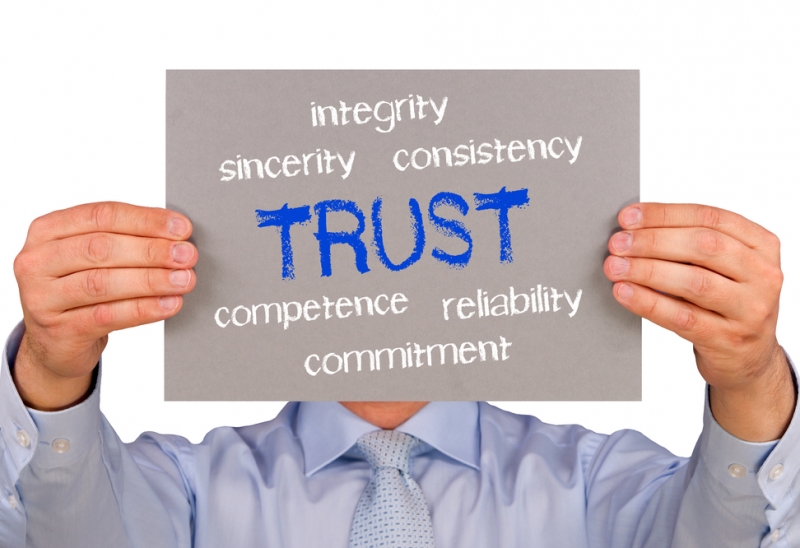Trust is What Leaders Critically Need to Provide in an Uncertain World: So How Do You Build it?
In times that are unheralded, where all the routines and guidelines are up ended, where social etiquettes are now unclear, where social norms are no longer the norm, where life’s routines are dishevelled, where work life has been displaced, where the workplace has now been reconfigured, where families and friends have been separated, where new policies, procedures and protocols are being implemented regularly, and where legislative bodies have intervened in our lives, what’s the one key ingredient in which leaders need to major? Trust.

If ever there was a time for leaders to shine, for leaders to stand out from the crowd and really lead, then this is it.
Trust has always been key for leadership. Professor Bruce Avolio in his book in 2011 titled, “Full Range Leadership Development” highlights the notion that the core of effective leadership is about trust; “…without trust, you can never achieve the full potential of your leadership”.
If trust has always been key, it is now paramount. In an insecure and changing world, leaders need to be the rock on which others can rely.
Unfortunately, as I often say in the workshops that I run, a crisis can bring out the worst or the best in people, including leaders. I ask the participants whether in times of crisis they are a lemon or an orange. When they are squeezed, what comes out of them, lemon juice or orange juice? When they are pressured, is their attitude and behaviour sour or sweet? Are you palatable or hard to digest?
It is easy when times are good and when things are going well and going smoothly for leaders to perform well. However, the mark of real leadership is in times of crisis and trauma and times of uncertainty. And much of leadership is about handling problems, issues, difficulties and crises. As a leader in a crisis, you can sink your leadership or you can shine. You can sabotage it or you can sail it.
The Emotional Bank Account
I like the work of Dr Stephen Covey (“The 7 Habits of Highly Effective People”) who offered the concept of the “Emotional Bank Account”. In our regular bank accounts with our financial institutions, we put down deposits and build up our accounts into the black. This provides us with assurances and some security; it provides us with a buffer for any hard times or for general purpose living.
At times or course, we need to withdraw and take some monies out of our accounts for various reasons. Of course, the key is to keep the account in the black or positive and not let it run into the red or overdraft.
In the same way that we operate our bank accounts, we have emotional accounts with those who surround us. It might be our family, friends, and neighbours. For leaders, it will be your direct reports, a boss, peers, and the company or organisation as a whole. Leaders need to understand that they actively need to lay down daily and regular deposits with their team in particular, and more generally, with those around them.
Whether you like it or not, you are going to make withdrawals as a leader. You are going to ask for things to be done or investigated and possibly by a deadline. You are going to be asking for reports or data. You might ask for some innovative or creative work to be undertaken or explored. You are going to be asking for meeting times whether 1:1 or group based. You are going to request that problems be fixed and sooner than later. You might even ask for alterations to the budget or even cuts to the budget. Do you have a healthy emotional deposit that stands you in good stead for these kinds of demands? Have you purposely built up a solid emotional account with those with whom you interact?
Stand out leaders have built up a positive emotional account over time. They have done it through trust.
On the other hand, toxic leaders who are more ego driven and controlling and who are often represented by arrogance, aggression, dominance, manipulative and narcissistic behaviour, all run their accounts in the red. People stay in the organisation simply because they have nowhere else to go or they feel trapped. They comply with requests through fear. They turn up at work, but simply go through the motions; they are present, but not really. Research shows that these kinds of companies do not do well economically (see E Seppala and K Cameron, “Proof that Positive Work Cultures are More Productive”, Harvard Business Review, Dec 2015; BL Fredrickson and MF Losado, “Positive Affect and the Complex Dynamics of Human Flourishing”, American Psychologist, 60(7), 678-686).
In a sense, it is a false economy. But these leaders just don’t get it. They are so consumed by their own world of ego and control. And probably, they’ll never get it. Sadly too, when these leaders finally move on, it can take from 5 to 10 years to turn the company or organisation around to create a more positive culture and a productive workforce.
The key to positive leadership and therefore positive organisations is trust. So how do you get it?
Basically, there are four major factors that bring about trust. Ignore them at your peril.

1. Authenticity
Call it what you will – authenticity, integrity, honesty even sincerity. Robert Rosenberg in his 2020 book “Around the Corner Around the World” says it is when “private and public conversations are the same”. It’s about telling the truth. It’s about calling a spade a spade and not an agricultural instrument.
Stephen Covey calls it character or personal credibility where you walk the talk and practice what you preach. Howard Morgan in his 2005 book, “The Art and Practice of Leadership Coaching” writes that “Credibility is the foundation of leadership. If we don’t believe in the messenger, we won’t believe the message”.
Being the real deal builds trust.
2. Competence
Call it capability if you like — fit for purpose. Are you capable as a leader? Do you perform to the standard for the job in question? This does not mean that you as a leader need to demonstrate a perfect performance without mistakes. Of course, we all make mistakes or have errors of judgement at some time, but the real leader shows some vulnerability, admits the error and seeks to remedy it.
It’s about being competent and consistently achieving the goals that are being pursued by the organisation. It’s about problem analysis and problem-solving skills where you define a difficulty or issue, analyse it, collect data if necessary and come up with recommendations to solve it.
It can often really be of significant benefit to have direct knowledge or hands-on skills in relation to the industry or field in which you might lead, but this does not always need to be so especially if the leader has a solid team around them know who the business and know it well. Irrespective, it is about being proficient in the job.
This builds trust and builds peoples’ confidence.
3. Reliability
Call it doing what you say you will do; DWYSYWD — being dependable. It’s called follow-up. This is the one that lets down leaders badly. You’re reliable when you deliver on your promises and you deliver on time and satisfactorily. If for whatever reason, you cannot deliver, then get back to the individual and say what you do intend to do and by when. Broken promises only serve to detonate trust.
Being dependable provides surety for others and allows them to get on with their business knowing that you’ll get on with yours. Consistency in being reliable builds trust; they can bank on you as a leader.
4. Empathy
Call it caring, support — being there for others. This means being sensitive to the needs and feelings of others, being aware of their moods and emotions. This means that we need to, as it were, get inside the other’s shoes, stand in their footprints, understand their frame of reference and see the situation from their perspective and their point of view. In the novel, “To Kill a Mockingbird”, listening appropriately to another person is described as the ability to jump inside the skin of the other person and walk around and see the world through the eyes of the other.
Research by Claudio Feser and others in 2015 (“Decoding Leadership: What really matters”, McKinsey Quarterly) came up with 20 distinct leadership traits. They surveyed 189,000 people in 81 diverse organisations internationally and found four factors that separated the high-quality teams and businesses from those not performing well. What did they find? One of the top factors for leadership was “Being Supportive”.
Now, this notion of caring and empathy for many leaders is a bridge too far. Sad really. They either haven’t got time for “this kind of stuff”, or they are too busy doing “real work” or they believe that their staff or peers just need to “get on with it”. Sometimes, these leaders are so logical and analytical, that they really “don’t have a feeling bone in their body” as the saying goes. Sometimes, it is all about them and their needs and wants.
I’m reminded of the quote from Dale Carnegie who said, “When dealing with people, remember you are not dealing with creatures of logic, but with creatures of emotion”.
Being committed to others’ well-being and treating people with respect and understanding, is endearing and builds trust. As a leader, it’s not all about you. Instead, it’s about growing and empowering others and being sensitive to their needs and wants, showing concern for them and treating them as individuals and not as a statistic or a number or “just an employee”.
Showing real caring for people is one of the quickest ways to build trust.
Summary
What will it take to become an authentic leader and to ensure that your integrity remains even in the face of the occasional “wobble” or stumble?
What will it take to ensure that you remain competent and across your job?
What will it mean for you to be seen as reliable and dependable and one who follows up and doesn’t forget to do what you say you were going to do?
What will it mean for you to ensure that you are emotionally tuned to those around you and that as a result, you demonstrate care and understanding?
In a day and age when our world has been turned upside down and what we took for granted is no longer there, this is when real leadership flourishes and does so by building trust. This is key. This is paramount.
Build trust during a crisis (or at any time) and you will lay down valuable emotional deposits meaning that as a leader you will no doubt also gain loyalty and respect that stands you in good stead to lead when the crisis eases off and better times return. It means that you will have made a lasting contribution to the lives of others; you will have left a legacy.
And isn’t that what really good leadership is all about?

Comments are closed.